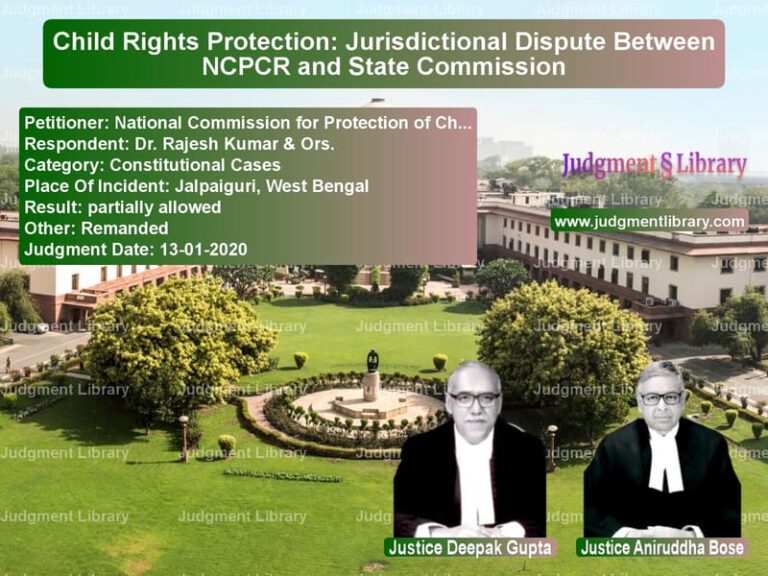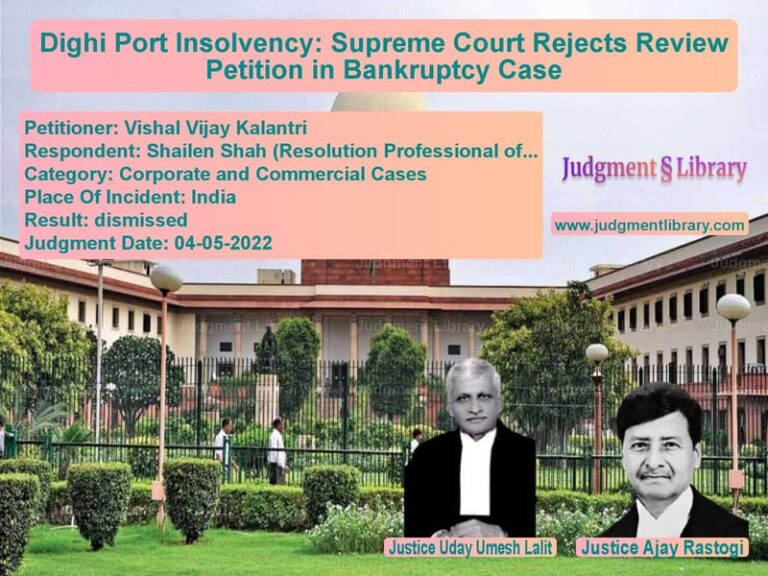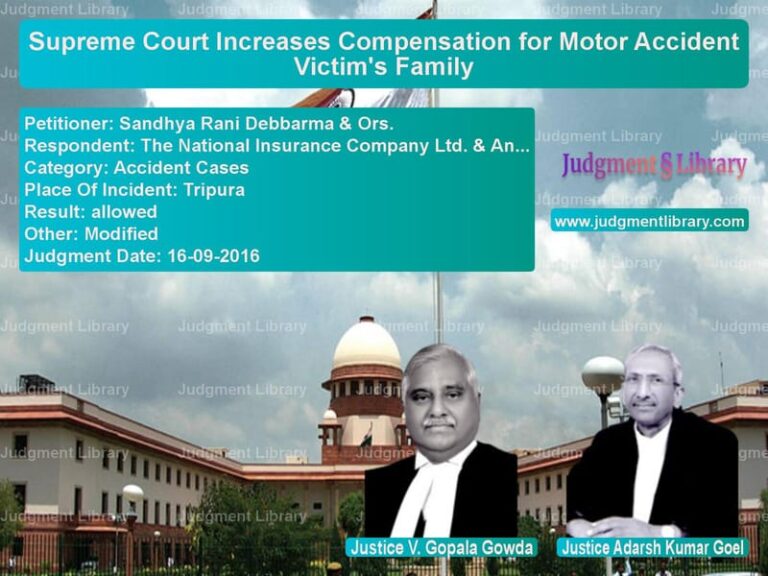Supreme Court Upholds Age Relaxation and Bonus Marks for Rajasthan Prabodhak Recruitment
The Supreme Court of India recently delivered a significant judgment in the case of Mahesh Chand Bareth & Anr. v. State of Rajasthan & Ors., addressing key issues related to recruitment policies for the post of ‘Prabodhak’ (teacher) under the Rajasthan Panchayati Raj Prabodhak Service Rules, 2008. The case involved challenges to the state’s provisions for age relaxation and the awarding of bonus marks to candidates who had prior teaching experience in government educational projects. The Court ultimately upheld these provisions, dismissing the appeals.
Background of the Case
The case stemmed from a recruitment advertisement issued on May 31, 2008, for filling approximately 20,060 vacancies for the post of Prabodhak. The recruitment process was governed by the Rajasthan Panchayati Raj Prabodhak Service Rules, 2008. The appellants, who were private school teachers and candidates from non-government educational institutions, challenged two key provisions of the recruitment process:
- Age Relaxation (Rule 13(v)): The provision allowed candidates who had served under government educational projects like Rajiv Gandhi Pathshala, Shiksha Karmi Board, Lok Jumbish Pariyojana, Sarva Shiksha Abhiyan, and the District Primary Education Programme to be considered within the age limit if they had initially joined within the prescribed age limit.
- Bonus Marks for Teaching Experience: Additional marks were awarded to candidates with teaching experience in government-run educational projects, with each academic session granting up to five marks, to a maximum of 25 marks.
Key Legal Issues Considered
- Whether Rule 13(v) providing age relaxation to candidates with project experience was discriminatory and violated Article 14 of the Constitution.
- Whether the awarding of bonus marks for candidates from government educational projects was arbitrary and ultra vires the recruitment rules.
- Whether the guidelines for awarding bonus marks, issued on May 27, 2008, but not included in the recruitment advertisement, constituted a change in the “rules of the game” after the selection process had begun.
Arguments by the Appellants
- Rule 13(v) was discriminatory as it provided age relaxation only to candidates from government educational projects while denying the same to similarly situated candidates from private schools.
- The awarding of additional bonus marks to project candidates unfairly disadvantaged other eligible candidates, effectively favoring government-employed candidates.
- The recruitment advertisement did not mention bonus marks, and the May 27, 2008, guidelines introduced them retroactively, altering the selection process after applications had been submitted.
Arguments by the State of Rajasthan
- The recruitment process aimed to address rural education challenges by selecting candidates with relevant experience in difficult teaching environments.
- The projects in question were designed to mitigate teacher absenteeism in remote areas, and the candidates from these projects had gained valuable experience.
- Granting bonus marks for government project experience had a rational nexus to the objective of ensuring qualified teachers for Rajasthan’s rural education system.
- The Supreme Court had previously upheld similar recruitment policies favoring candidates with experience in public service schemes.
Supreme Court’s Analysis
The Supreme Court upheld the recruitment provisions, making the following key observations:
- Age Relaxation (Rule 13(v)): The Court found that the provision was justified given the historical background of Rajasthan’s educational projects. Candidates from these projects had worked under challenging conditions, earning valuable experience, and ensuring their eligibility for recruitment aligned with the larger policy goals of the state.
- Bonus Marks for Teaching Experience: The Court held that the bonus marks were neither arbitrary nor discriminatory. The government had a legitimate interest in prioritizing experienced candidates familiar with teaching in rural Rajasthan.
- Legality of Guidelines: The Court ruled that the May 27, 2008, guidelines were issued before the recruitment advertisement and were not an arbitrary afterthought. They merely supplemented the recruitment rules without changing the fundamental eligibility criteria.
- Precedents Applied: The Court cited previous judgments, including Union of India v. Shivbachan Rai and Satya Dev Bhagaur v. State of Rajasthan, to support the principle that policy decisions on age relaxation and experience-based advantages should not be interfered with unless they are palpably arbitrary.
Final Verdict
The Supreme Court dismissed the appeals, ruling that:
- Rule 13(v) was constitutionally valid and did not violate Article 14.
- The awarding of bonus marks for government project experience was justified and not ultra vires.
- The May 27, 2008, guidelines did not alter the selection criteria unfairly.
Impact of the Judgment
- Validation of Experience-Based Hiring: The ruling reinforces the principle that government recruitment can prioritize candidates with relevant experience.
- Precedent for Age Relaxation: States can provide age relaxations for candidates engaged in government projects, provided there is a reasonable nexus between the relaxation and the recruitment objectives.
- Clarity in Recruitment Processes: The judgment ensures that policy decisions made before an advertisement cannot be challenged as “changing the rules of the game” post-facto.
Conclusion
The Supreme Court’s ruling in this case reaffirms the government’s authority to structure recruitment policies that prioritize experience and align with broader educational objectives. By upholding the Rajasthan government’s decision to favor candidates with prior teaching experience in state-run projects, the Court has set a strong precedent for similar recruitment policies across India.
Petitioner Name: Mahesh Chand Bareth & Anr..Respondent Name: State of Rajasthan & Ors..Judgment By: Justice Surya Kant, Justice K. V. Viswanathan.Place Of Incident: Rajasthan.Judgment Date: 08-07-2024.
Don’t miss out on the full details! Download the complete judgment in PDF format below and gain valuable insights instantly!
Download Judgment: mahesh-chand-bareth-vs-state-of-rajasthan-&-supreme-court-of-india-judgment-dated-08-07-2024.pdf
Directly Download Judgment: Directly download this Judgment
See all petitions in Recruitment Policies
See all petitions in Public Sector Employees
See all petitions in Promotion Cases
See all petitions in Judgment by Surya Kant
See all petitions in Judgment by K.V. Viswanathan
See all petitions in dismissed
See all petitions in supreme court of India judgments July 2024
See all petitions in 2024 judgments
See all posts in Service Matters Category
See all allowed petitions in Service Matters Category
See all Dismissed petitions in Service Matters Category
See all partially allowed petitions in Service Matters Category







